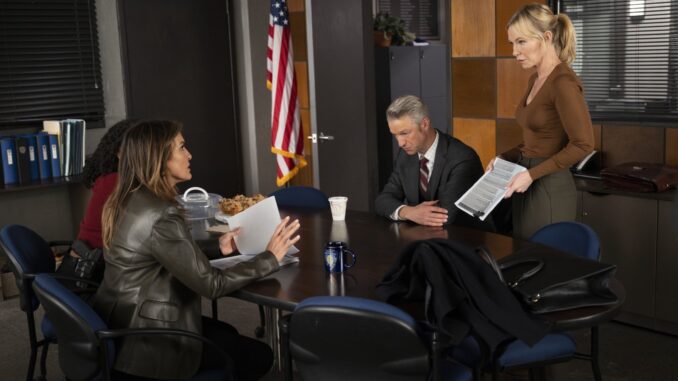
The Undying Anchor: 5 Impactful Law & Order: SVU Cast Changes Amid Mariska Hargitay’s Constant Presence
For over two decades, “Law & Order: Special Victims Unit” has been a television staple, a grim yet gripping portrayal of the complexities of sexual assault and its impact on survivors. Through it all, one constant has remained: Mariska Hargitay as Olivia Benson. Hargitay’s nuanced performance and dedication to the character have cemented her as the heart and soul of the series. But even the most stalwart anchor needs a crew, and over the years, SVU has witnessed significant cast changes that have profoundly shaped its dynamic, often in the shadow of Benson’s enduring presence. These shifts haven’t been mere cosmetic upgrades; they’ve altered the show’s tone, thematic focus, and the very fabric of Olivia’s journey. Here are five particularly impactful cast changes that have rippled through the show’s landscape.
The first significant tremor was the departure of Christopher Meloni as Elliot Stabler in 2011. Stabler’s volatile intensity was the yang to Benson’s measured empathy. Their partnership, built on mutual respect and a simmering, unspoken tension, was the series’ cornerstone. Meloni’s exit was a seismic shock, leaving a void not easily filled. The dynamic, built on years of shared trauma and professional reliance, vanished overnight. More than just a detective, Stabler was a reflection of Benson’s internal struggles: his explosive nature a counterpoint to her attempts at control, his unwavering loyalty a mirror of her own. His absence forced Benson to evolve, to take on more responsibility and confront her own demons without the familiar safety net. The impact was palpable, shifting the show’s focus from a dual investigation to a more singular narrative centered on Benson’s leadership and resilience.
Following Stabler’s departure, the arrival of Danny Pino as Nick Amaro aimed to inject a fresh dose of energy into the squad room. Amaro, a former street cop, brought a raw, unfiltered perspective, grappling with his own personal demons and often clashing with Benson’s more seasoned approach. While he possessed a charm and undeniable skill as a detective, Amaro served a different purpose than Stabler. He represented a new generation of law enforcement, grappling with evolving societal expectations and the complexities of justice. While his dynamic with Benson never reached the same intensity as with Stabler, his presence highlighted her evolving role as a mentor and leader, forcing her to navigate intergenerational differences and different approaches to justice.
Another impactful shift came with the introduction of Ice-T as Odafin “Fin” Tutuola. While originally a supporting player, Fin’s role gradually expanded, becoming a crucial voice of experience and a pragmatic counterweight to Benson’s often emotionally driven decisions. Fin brought a street-wise sensibility to the squad room, offering a different perspective on the victims and perpetrators they encountered. His gruff exterior often masked a deep empathy, and his unwavering loyalty to Benson provided her with a crucial confidante. Fin’s evolution from a cynical observer to a trusted colleague and friend underscored the importance of diverse voices and perspectives in navigating the complexities of SVU’s cases. He offered a grounding force, a constant reminder of the human cost of these crimes.
The addition of Kelli Giddish as Amanda Rollins brought a different kind of energy to the squad room. Rollins, a detective transferred from Atlanta, carried her own baggage and faced her own struggles with addiction and personal relationships. Her vulnerability and resilience resonated with viewers, and her complex dynamic with Benson added another layer to the show’s exploration of female mentorship and support. Rollins’ presence allowed SVU to delve into the complexities of trauma and recovery, both in the victims they served and within the detectives themselves. Her struggles with personal demons and her dedication to her job highlighted the toll that this kind of work takes on those who dedicate their lives to fighting for justice.
Finally, the recent return of Christopher Meloni as Elliot Stabler in his own spin-off, “Law & Order: Organized Crime,” and his subsequent crossovers with SVU, has brought the past rushing back. While not a full-time member of the SVU squad, Stabler’s re-entry into Benson’s life has forced her to confront unresolved feelings and the lingering trauma of their shared history. His presence, even in guest appearances, serves as a constant reminder of the choices she has made and the path she has forged. It allows for a continued exploration of their evolving relationship, demonstrating that even after years apart, the bond forged in the crucible of SVU remains unbreakable, albeit changed.
In conclusion, while Mariska Hargitay’s Olivia Benson remains the steadfast anchor of “Law & Order: SVU,” the ebb and flow of the cast has significantly shaped the show’s evolution. From the explosive departure of Stabler to the grounded pragmatism of Fin, each cast change has brought new perspectives, challenges, and ultimately, a deeper understanding of the complexities of sexual assault and the enduring power of resilience. These changes, while often jarring, have ensured that SVU remains relevant, engaging, and a compelling reflection of the ever-evolving landscape of justice and healing. Ultimately, they underscore that even the strongest anchor needs a diverse and dynamic crew to navigate the turbulent waters of human experience.
